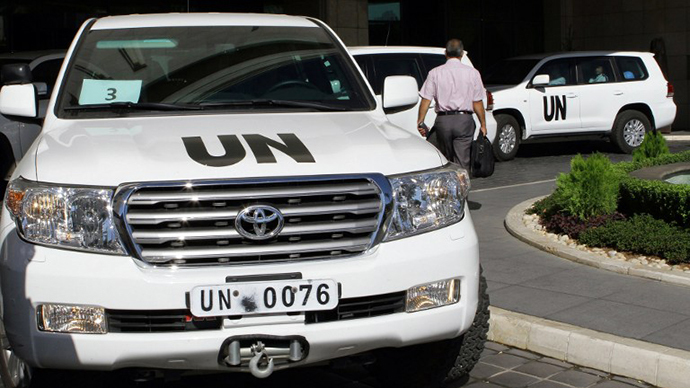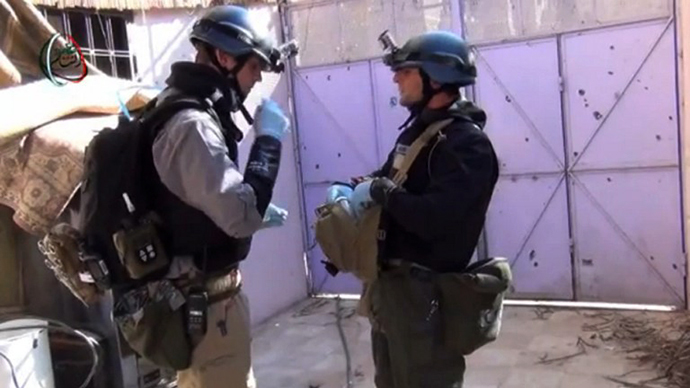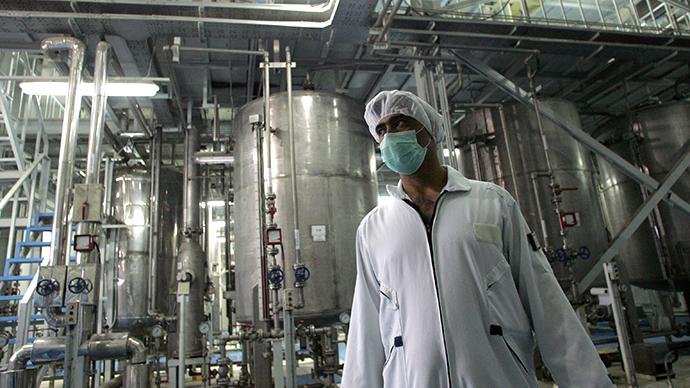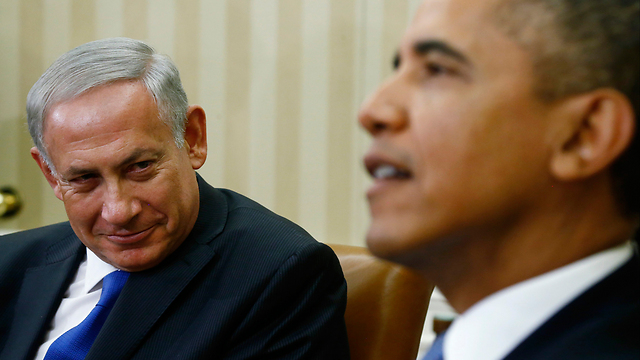http://rt.com/news/syria-chemical-destroy-assad-804/



Khamenei doesn't trust US as negotiating partner
Perspective....
http://www.ynetnews.com/articles/0,7340,L-4436755,00.html

Intl сhemical team 'starts' destroying Syria arsenal, machinery

United Nations vehicles are seen leaving the hotel in Damascus on October 3, 2013. (AFP Photo / Louai Beshara)
A team of international experts are leaving to begin the "verification and destruction" of Syria’s chemical weapons arsenal, agencies report. By the end of Sunday a combination of weapons and production equipment will have been put out of order.
The source stated the team from the UN and the Organization for the Prohibition of Chemical Weapons (OPCW) “have left for a site where they are beginning verification and destruction.”
“Today is the first day of destruction, in which heavy vehicles are going to run over and thus destroy missile warheads, aerial chemical bombs and mobile and static mixing and filling units,” the anonymous official, told AFP.
The team crossed into Damascus on Tuesday tasked with dismantling Assad's estimated 1,000-ton chemical weapons stockpile.
A UN official confirmed to AP that the weapons inspectors have begun to destroy the stockpile and machinery.
Earlier this week, a Hague-based OPCW official stated that all “expedient methods” would be used to ensure Syria’s production facilities would be rendered unusable. He added that procedures might entail the use of explosives, sledgehammers, or the pouring in of concrete.
“We're very transparent. The experts can go to every site. They are going to have all the data from our government,” Assad told German magazine Der Spiegel on Sunday.
The mission follows a UN resolution which demanded that Syria’s chemical weapons arsenal be destroyed. The procedure to purge the country of chemical weapons stocks has a target finish date of mid-2014.
The US and its allies have been threatening Syria with military action in response to the August 21 attack in Damascus's eastern Ghouta suburbs, when UN experts say sarin gas was used “on a large scale.”

A United Nations (UN) arms experts inspecting the site where rockets had fallen in Damascus' Moadamiyet al-Sham suburb as they investigate an alleged chemical weapons strike near the capital. (AFP Photo / Moadamiyet al-Sham media centre)
Both Syria’s government and rebel forces have accused each other of using chemical weapons, and both sides have denied carrying out attacks.
The US and Britain were quick to accuse the Assad regime of perpetrating the August 21 attack, based on the warheads’ technical characteristics, established by UN experts.
Russia and Syria accused the US and its allies of jumping too quickly to conclusions. Damascus claimed that the UN had ignored evidence passed to them confidentially. Russia, who believes the Aug.21 attack was a provocation by the rebels, has been calling for a so-called “Geneva-2” peace conference.
The US and Britain were quick to accuse the Assad regime of perpetrating the August 21 attack, based on the warheads’ technical characteristics, established by UN experts.
Russia and Syria accused the US and its allies of jumping too quickly to conclusions. Damascus claimed that the UN had ignored evidence passed to them confidentially. Russia, who believes the Aug.21 attack was a provocation by the rebels, has been calling for a so-called “Geneva-2” peace conference.
The UN Syria peace envoy, Lakhdar Brahimi, said on Sunday that it was not certain that mid-November peace talks will take place in Geneva as planned. “This is not a certainty…I am encouraging everybody to come to Geneva in the second half of November,” he said in an interview with TV5 television and RFI radio.
Long-term plan for eliminating stockpiles
Alongside the aforementioned usage of explosives and sledgehammers, a larger piece of chemical processing equipment will play a role in the destruction of chemical weapons stockpiles.
In early November, a mobile and highly developed disarmament system will be constructed, according to the New York Times.
The Field Deployable Hydrolysis System will probably be set up outside the country, in order to neutralize large quantities of chemicals that are to be transported outside the country’s borders. The process will see the conversion of chemical agents into compounds which cannot be put to military use.
A US state department official told the New York Times that the mobile system is an “early demonstration” that steps are being made to shrink the weapons’ arsenal.
Iran....
http://rt.com/news/iran-arrested-nuclear-sabotage-800/
Iran arrests 4 men in 'nuclear facilities sabotage' plot

An Iranian technician works at the Isfahan Uranium Conversion Facilities (UCF), 420 kms south of Tehran (AFP Photo / Behrouz Mehri)
The Iranian authorities have arrested four men for planning to sabotage nuclear sites, reports state news. The announcement comes as Iran’s newly-appointed president takes steps to allay fears over its supposed nuclear weapons program.
The head of Iran’s Atomic Energy Organization, Ali Akbar Salehi, announced on Sunday that a "number of saboteurs" had been caught “red-handed” before they could carry out their plan.
"Four of these individuals were caught red-handed and their interrogations are ongoing," he said, according to the Mehr news agency on Sunday. Salehi did not elaborate on any of the details of the alleged plot to sabotage Iranian nuclear facilities and did not specify the nuclear sites that were targeted.
He added that the suspects were now being interrogated by Iranian authorities.
Iran has accused the West on a number of occasions of sabotaging its nuclear program. In the past Tehran has slammed the US and Israel for orchestrating the Stuxnet cyberattack on nuclear facility systems in 2010. Iran has also claimed the West is behind the assassination of its nuclear scientists.
The arrest of the suspected saboteurs comes as the Iranian government takes steps to dispel western fears over its nuclear program. The West believes that Iran is developing nuclear weapons, something that the country’s leadership has consistently denied, maintaining its nuclear program is for civilian purposes.
New to office, President Hassan Rouhani has reached out to Washington in a move to restart negotiations over Iran’s supposed nuclear weapons program.
Rouhani spoke to President Barack Obama last week in a telephone call, which marked the first talks between US and Iranian leaders in over three decades.
As it stands President Rouhani is set to meet with leaders from the UK, Germany, France, Russia and China in Geneva in mid-October in landmark negotiations. Iran’s new moderate leadership wants to lift the crippling economic sanctions implemented against Tehran by Washington with a view to curtailing the Iranian nuclear program.
Tehran has said that the international community must come up with new conditions before the negotiations in Geneva. Currently, Britain, China, France, Russia and the United States - the five permanent members of the United Nations Security Council - plus Germany demand that Iran cease enrichment of uranium to 20 per cent. In addition, they have asked Tehran to ship out some uranium stockpiles.
Iran’s new stance on the nuclear issue has been hailed by world leaders as a step in the right direction and a possible end to the diplomatic stalemate.
‘Iran is one year away from nuclear armament’
However, Washington has voiced skepticism over Tehran’s motives. On Friday Obama told press that while Rouhani was saying “all the right things,” it remains to be seen whether or not he will follow through with his pledges. In addition, Obama stated that Iran is one year away from developing a nuclear weapon, citing US intelligence sources.
Israel, on the other hand, claims that Tehran’s wish to negotiate is merely a ruse and Iran is months away from developing its nuclear capabilities. Israeli Prime Minister Benjamin Netanyahu has warned that Israel will move to strike Iranian nuclear facilities if Tehran does not cease its alleged nuclear weapons ambitions.
On Tuesday Netanyahu urged the UN General Assembly not to be fooled by Iran, stressing that Israeli was ready to “stand alone” against the country it has branded an enemy of the state.
“Rouhani is a wolf in sheep’s clothing – a wolf who thinks he can pull the wool over the eyes of the international community,” said Netanyahu. He appealed to the international community to keep the financial penalties against Tehran in place.
and the " trust " issue ...
and....
Iran’s Leader “Optimistic” about Rowhani’s US Diplomacy, but Skeptical of Washington, Israel
Posted on 10/06/2013 by Juan Cole
Iran’s supreme Leader, Ayatollah Ali Khamenei, spoke on Saturday to cadets at a military school, and in the course of his speech he referred to the new round of diplomacy with the United States initiated by President Hassan Rouhani with the United States. Khamenei was largely supportive of Rouhani’s initiative, saying “we approve and support the government’s diplomatic moves.” He said he is “optimistic” about the Iranian government’s “diplomatic initiative.”
He did say that something “inappropriate” (ghayr-i mola’em) occurred on Rouhani’s trip, which is probably a reference to the Iranian president’s brief phone call with Barack Obama. That phone call had also been criticized by Gen. Mohammad Ali Jaafari, the head of the Iranian Revolutionary Guards Corps. Jaafari said that Rouhani should have waited until he had gotten something tangible from the US before making that call to Obama. Khamenei seems to agree. But note that Jaafari didn’t say no such call should ever be made, only that it was premature given that so far Rouhani is empty-handed.
On the other hand, Khamenei expressed suspicion of whether the US is negotiating in good faith. He views it as an aggressive power seeking dominance over others, and reminded his young audience of the treaty of extraterritoriality that Iran had with the United States in the 1960s and 1970s, when there were US bases and US troops in Iran. By the terms of the treaty, US military personnel were not subject to Iranian law of courts. Khamenei recalls that an American sergeant could beat up an Iranian colonel, and the Iranian would have no recourse. (Similar resentments recently beset the Shiites of Iraq, which is one reason the Iraqi parliament declined to allow US troops to stay in that country after December of 2011).
Khamenei also decried the US, which he said is “dominated” by what he called “the international Zionist network.” That is, he sees the US as subordinate to Israeli influence rather than as acting in American interests. He doesn’t explain how the US can be “arrogant” and “trespassing” but also allow itself to be bossed around by a small country of 7.5 million.
The suspicion is mutual. On Saturday President Obama said that Iran was a year or more away from having a nuclear weapon. While he may have intended to tamp down Israeli hysteria that Iran is on the brink of having warheads, he conceded too much by his phraseology. It is not proved that Iran has a nuclear weapons program at all, or that it is even seeking a bomb, as opposed to a breakout capability. So it may not be a year away from having a bomb, it may be forever from having one.
Undersecretary of State for political affairs Wendy Sherman the point person in US negotiations with Iran, asked Congress not to impose a new round of sanctions on Iran given it just opened a round of diplomacy. But she went on to say that the Obama administration would insist on thorough-going negotiations, saying of Iran that “we know that deception is part of the DNA”.
I don’t think people in Washington who talk like that realize how offensive such language is, with racialist overtones. Try saying of a Western country that deception is part of its people’s DNA and see what happens to you. I’m sure the Islamic Republic is duplicitous, but I’m not sure it is a matter of DNA or that it is more duplicitous than many other governments that are US allies.
In any case, Khamenei has given evidence in support of Rouhani’s assertion that the Leader has given him support in his diplomatic initiative, and has expressed “optimism” about that initiative despite his distrust of Washington and its special relationship with Israel.
The USG Open Source Center translated Khamenei’s remarks from his website.
“Iran’s Supreme Leader ‘Pessimistic’ About USA
. . . Speech by Iran’s Supreme Leader Ali Khamene’i at a military cadets ceremony in Tehran on 5 October — recorded
Leader.ir
Saturday, October 5, 2013
Document Type: OSC Translated TextThe Iranian nation is a nation that has shown its firmness in defending its ideals and interests and it has shown its desire for safety and peace and coexistence with Muslim brothers and all human beings. These are parallel to each other. We should add that we approve and support the government’s diplomatic moves. We emphasize diplomatic efforts and measures along with the Iranian nation’s comprehensive preparedness . . . We support whatever our government does, be it the recent events of the (president’s and foreign minister’s) trip (to New York) or other diplomatic efforts and measures they take. Of course, some of the things that happened during the New York trip, we believe, were not proper. However, we are optimistic about the diplomatic delegation of our dear nation and its servant, the government.Certainly, we are pessimistic about the Americans. We do not trust them. We consider the government of the United States of America as an unreliable, arrogant, illogical, and trespassing government, which is badly possessed and dominated by the international Zionist network. They are forced to appease the extorter and forged regime that has occupied Palestine to observe the illegitimate desires and interests of the international Zionist network. They ought to be flexible against it for the interests of the international Zionist network.They call it America’s interests, whereas America’s national interests entirely contradict what they are doing today in support of the forged regime. The government of the United States of America is blackmailing the entire world, appeasing the forged Zionist regime. We witness these facts. We do not trust the US government. We trust our own officials. We are optimist and we want them (officials) to take right and firm steps carefully and considering all aspects. They should not forget national interests even for a second.The important point for the Islamic Republic’s system is the internal strength of the structure of the Islamic Republic, the internal strength of the Iranian nation. This has managed to protect the country, national unity, respect to great ideals of the Islamic Republic, and respect to the national honor. The Iranian nation is a dear nation. The revolution gave honor back to them.The time when an American sergeant could dare to beat up an Iranian colonel on Iranian land and officials of our dear country had to observe the arrogant enemies is over. The Islamic Republic made the Iranian nation dear. This honor remains and it is increasing day by day. It is the duty of all officials and the Iranian nation to defend and steward it. A nation becomes proud by its main identity and honor. Otherwise, the nation cannot make progress. The duty of the Armed Forces is to be prepared. They should have the spirit to defend the ideals and the nation that trusts them and backs them.”
and....
« Breaking News »
DEBKAfile October 5, 2013, 1:41 PM (GMT+02:00)
Iranian Supreme Leader Ayatollah Ali Khamenei said on Saturday he supported President Hassan Rouhani's diplomatic initiative at the UN General Assembly last week but that some of what occurred there was "not proper". In his first comments since Rouhani spoke by phone to President Barack Obama, the supreme leader emphasized that he does not trust the US as a negotiating partner. While we are optimistic about our government's diplomatic staff, we are pessimistic about the Americans, said the Iranian leader. "The U.S. government is not trustworthy, is self-important, and breaks its promises."
Nuclear negotiations between Iran and the Six World Powers are set to resume in Geneva on Oct. 15.
Perspective....
http://www.ynetnews.com/articles/0,7340,L-4436755,00.html
'Israel doesn't have veto powers over Iran issue'
Western diplomat involved in nuclear talks makes it clear: Israel's concerns taken seriously, but Netanyahu is out-of-step with other nations
Israeli Prime Minister Benjamin Netanyahu said this week that Iran's new president was a "wolf in sheep's clothing", but he himself looked increasingly like a lone wolf as his allies seek to bring Tehran into the fold.
One Western diplomat involved in Iranian nuclear diplomacy described Netanyahu as "out of step" with the mood of detente and a former senior US official cautioned that Israel would be unlikely to secure all its demands in any negotiations.
Related stories:
- Iran thaw warms Western oil company interest
- Biden: Nuclear Iran dangerous to Israel
- Iranian FM: Israel can't kill all our scientists
A diplomat from one of the P5+1 countries directly involved in the negotiations with Tehran stressed that while Israel's view was important, it did not have power of veto.

Netanyahu with Obama (Photo: AP)
"Israel will not be in the room if and when a deal is done," said the diplomat, who declined to be named. "We take Israeli concerns very seriously. But I have a feeling that Netanyahu is slightly out of step with other nations at the moment."
Not a member of the international negotiating team, the Israeli leader nonetheless laid out his conditions for a deal, including shutting down all Iranian uranium enrichment facilities and shipping out all its stocks of fissile material.
A former US official cautioned that a comprehensive nuclear rollback on Iran's side looks highly unlikely, meaning Netanyahu will have to calibrate his expectations.
"Negotiating means there will have to be some give on both sides," said Gary Samore, until recently the top nuclear proliferation expert on Obama's national security staff.
"I think it's unlikely that we are in a position to dictate to the Iranians that they have to meet all of our demands."
While Netanyahu still enjoys broad support at home for his unyielding approach, aides said he worried that Western powers, impressed by more clement rhetoric from new Iranian PresidentHassan Rohani, will "fumble the ball" and let Iran reach a point where it could rapidly put together a nuclear weapon.
Netanyahu has many friends in the US Congress and some of his key security officials believe that despite the reticence shown by lawmakers for action against Damascus, they would nonetheless rally to Israel's support in a showdown with Iran.

No comments:
Post a Comment